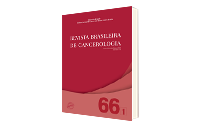Symptom Pattern in Colorectal Cancer Patients according to Age
DOI:
https://doi.org/10.32635/2176-9745.RBC.2020v66n1.474Keywords:
Colorectal Neoplasms, Quality of Life, Symptoms Assessment, Adult, AgedAbstract
Introduction: Colorectal cancer is among the most common types of cancer in the Brazilian and world population, with high rates of mortality. Some studies show that there is a difference in the symptomatic burden for this cancer among young adults and elderly individuals, which can deteriorate the quality of life of these patients. Objective: To investigate the difference in the pattern of symptoms among young adults and elderly patients with colon and rectum cancer. Method: Cross-sectional study using dataset on the prevalence of symptoms among colorectal cancer patients attended at the National Cancer Institute José Alencar Gomes da Silva (INCA) through a recently adapted inventory of symptoms for Brazil. Results: A total of 348 patients were interviewed, of which 101 were young adults (29,1%) and 247 (70.9%) were elderly individuals. There was a difference between the symptoms analyzed for pain (p=0.033), nervousness (p=0.013), drowsiness (p=0.033), sadness (p=0.003), problem with sexual interest or activity (p=0.014), loss of appetite (p= 0.028), irritation (p=0.013), change of food taste (p=0.042), hair loss (p=0.002.) and “I don’t look like myself ” (p<0.001). Conclusion: The symptomatic burden of colorectal cancer may differ according to age. This is relevant because reinforces the idea of individualizing the treatment to improve the care and, consequently, the quality of life of these patients.









